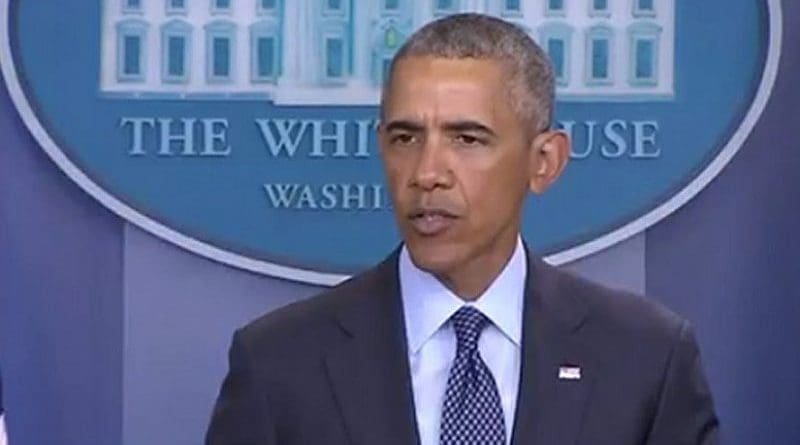Obama’s Half-Step – OpEd
Why is Benjamin Netanyahu, the right-wing Israeli prime minister, so ungracious to the United Nations, which helped create the state of Israel, and to Barack Obama, the American president who is eager to end the conflict between Israelis and Palestinians as he had declared that time may not be on the side of Israel especially when the Arab Spring is still sweeping the Middle East?
One would expect the arrogant Israeli leader whose “lecturing” – others described it as “chastising” even “rebuking” – of the American president in their face-to-face meeting last week when all Obama did was to repeat the American position vis-a-vis a Palestinian-Israeli settlement voiced by all his predecessors since the creation of Israel by the UN General Assembly 63 years ago this month. The only change was that Obama mentioned the date – 1967 – when Israel occupied all of Palestine and additional Syrian and Egyptian border areas.
Weeks before Britain terminated its mandate in Palestine on 15 May 1948, the U.N. General Assembly, which has been debating that Middle East crisis, realized that a vote on the proposed partitioning of Palestine would not pass. Only 30 countries against 16 and 10 abstaining had favored the draft resolution, that is, one short of two-thirds majority needed for its passage. Both sides applied pressure on the members and reportedly with some American arms-twisting, – Haiti, Liberia and Philippines – switched their votes, facilitating the passage of the creation of Israel and a smaller portion for the Palestinian Arabs. (For the record, then Indian Prime Minister Jawaharlal Nehru said Zionists had tried to bribe India with millions of dollars and Liberia’s ambassador in Washington complained that the U.S. delegation threatened to cut financial aid to several countries.)
Now, Israel is vehemently against the Palestinians seeking recognition from the U.N. General Assembly next September and, much to the shock of Palestinians, Obama has joined hands with the Netanyahu government just as he did when Israel refused last year to freeze all Israeli settlement activity in the West Bank, a position that helped derail the peace talks about to start then.
The so-called “Middle East Week” in Washington was hardly a game-changer. Netanyahu has repeated his rejection of Obama’s position that peace talks should resume on the basis of the 1967 armistice lines which, in fact, amounted to an Israeli land grab, amounting to an additional 25 percent of the occupied Palestinian territory it won beyond its proposed 1948 borderline and in the 1967 war against Syria, Jordan and Egypt.
Moreover, Netanyahu declared last Tuesday before the U.S. Congress, where he was applauded more than two dozen times, often members standing up and cheering, that Israel would refuse dividing Jerusalem and, as well, allowing Palestinian refugees to return to their occupied homes in compliance with the U.N. General Assembly Resolution 194 passed on 11 December 1948.
President Obama’s suggestions for a Palestinian-Israeli settlement were interestingly voiced on the eve of Netanyahu’s arrival in Washington. He noted that “at a time when the people of the Middle East and North Africa are casting off the burdens of the past (as ushered by the Arab Spring), the drive for a lasting peace that ends the (Palestinian-Israeli) conflict and resolves all claims is more urgent that ever.”
In a “non-militarized” Palestine state, he proposed that the attention of the two parties should focus primarily on defining the borders of the two states as well as all related security issues. In statement at the State Department before a large audience that included Arab and Israeli ambassadors, he suggested that the other “core issues” – Jerusalem and the case of the Palestinian refugees – would be discussed in a second stage.
Obama’s remarks, including a later address before the pro-Israel lobby, known as the American Israel Public Affairs Committee (AIPAC), hardly generated new ideas. Although the Palestinians appeared satisfied that Obama rekindled the focus on the 1967 armistice line, his suggestion that the Palestine state should be demilitarized, and that the unity agreement between the two Palestinian factions, Fateh and Hamas, raised “profound and legitimate questions from Israel” upset many, many Arabs. His failure to underline the occupation of Arab sector of Jerusalem as well as the continued Israeli settlement activities in the West Bank where some Israeli cabinet ministers and senior officials live, were shocking.
If Obama chooses to be even-handed, as he sometimes appears to be, he ought to suggest to his Democratic Party to invite Palestinian President Mahmoud Abbas to address Congress and hear the other side of the story; and certainly pay a visit to the White House. This would certainly amount to more than the half of a step that he has taken so far.

